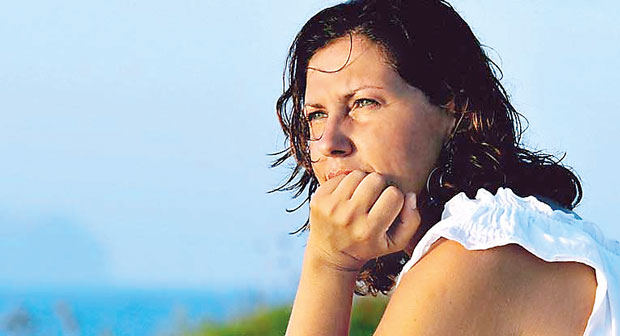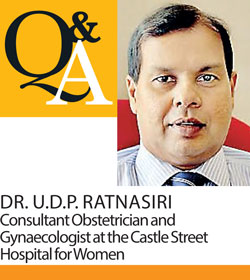16 Feb 2018 - {{hitsCtrl.values.hits}}

 From the moment of birth to the last breath that we take, there are milestones in our life, which can be considered as transition points from one era of life to another. Menopause is one such important milestone in the life of a woman. It marks the end of her fertile reproductive period, and the beginning of the next more relaxing period of her life. This transition can be a challenging period of time to a woman. Are there any steps that you could follow to make this transition smoother? Health Capsule consulted Dr. UDP Ratnasiri, Consultant Obstetrician and Gynaecologist at the Castle Street Hospital for Women, to obtain more information on the topic, on behalf of our readers.Following are excerpts of an interview done with
From the moment of birth to the last breath that we take, there are milestones in our life, which can be considered as transition points from one era of life to another. Menopause is one such important milestone in the life of a woman. It marks the end of her fertile reproductive period, and the beginning of the next more relaxing period of her life. This transition can be a challenging period of time to a woman. Are there any steps that you could follow to make this transition smoother? Health Capsule consulted Dr. UDP Ratnasiri, Consultant Obstetrician and Gynaecologist at the Castle Street Hospital for Women, to obtain more information on the topic, on behalf of our readers.Following are excerpts of an interview done with
Dr. Ratnasiri.
QWhat is Menopause?
Menopause is defined as cessation of menstruation in a woman. Medically speaking, we consider a woman is having her menopause when she did not have her menstrual period for a year in a row or in women who are having symptoms of menopause, for six months in a row.
Q What’s the usual age that a woman undergoes menopause?
There is no specific age as such, since it differs from woman to woman. Usually the average age for menopause ranges from 45 years to 50 years of age. But this is subjected to change in different ethnic groups, countries etc.
Q Why does this happen?
The causing factor for menopause is the failing of the ovaries of a woman. The two main functions of the ovaries include ova production and synthesis of hormones like oestrogen and progesterone. First, the process of ovulation ceases due to a lack of ova. Then the hormones produced by the ovaries also disappear gradually, over time.
Q What are the symptoms related to menopause?
Most of the symptoms of menopause are due to the lack of the hormone oestrogen. Oestrogen has a big role in maintaining the functions of the female genitourinary system. In addition, it helps in maintaining the emotional stability of a woman.
The symptoms can be categorized into physical, psychological and psychosomatic.
Physical symptoms include dryness in vagina, Incontinence, urinary urgency or lack of ability to control the bladder muscles, lack of libido and pain during intercourse.
Psychological symptoms can present as depression, lack of memory and reduced tolerance to external stimuli resulting in emotional instability.
Psychosomatic symptoms or the physical symptoms which are aggravated by mental factors include hot flushes, night sweats and irritability.
Additionally and perhaps more importantly, there are long term consequences associated with menopause like bone fragility which is associated with increased risk of fracture in hip bones and arm bones as well as the vertebral column. Skin changes like reduced elasticity can also happen long-term.
QIs there any treatment for the symptoms?
Yes. Treatment has a place, especially when it comes to women who are having early menopause, as well as in women who have severe, life disturbing symptoms. Hormone Replacement Therapy (HRT), or supplementation of the deficient hormones from outside is the main method of treatment.
If the menstrual period ceases before 40 years of age, they have to undergo investigations including blood hormone assays to confirm that they are indeed having menopause. They will have to take hormone replacement therapy, until the age of normal menopause, in order to minimize the risk of fractures and other side effects.
Women who are having severe symptoms related to menopause may also be prescribed hormone replacement therapy, in order to improve their quality of life.
In addition, lifestyle modifications play an important role in treating menopausal symptoms.
About HRT
There are two categories of HRT. Oral oestrogen and combined HRT; containing both oestrogen and progesterone. Oestrogen only pills are known to increase the risk of cancer in the uterus, hence is usually only prescribed to women who have undergone surgery to remove their uterus. To relieve local symptoms like vaginal dryness and urinary insentience, vaginal pessaries and creams containing oestrogen can be used.
But to prevent systemic effects like fractures, oral or hormonal patches should be used.
QIs Hormone Replacement Therapy advisable to all women undergoing menopause?
No. Consulting a doctor before starting HRT is extremely important because HRT is not for everyone. Women who are having medical problems like clotting problems should not take HRT. It is not advisable to continue with therapy after 60 years of age because there is a risk of significantly increasing cardiovascular diseases and breast cancer.
Q What is the place that lifestyle modifications have in treating menopause associated symptoms?
Stopping or minimizing smoking and alcohol intake, daily exercises, dietary modifications to include a balanced diet, low in fatty and starchy food, has proven beneficial in reducing the symptom severity. In addition, minimizing the stress through engagement in social work, going on trips or having other leisure activities will also help in coping with the challenges of menopause.
Q Any last message to the readers?
Yes. Unlike in the past, with the development of the world, people live longer. So, by the time that a woman goes through menopause, approximately 1/3rd of her life lies ahead of her. So, she need to anticipate the challenges, both physical and psychological that menopause would bring. Leading an active healthy life from a young age can go a long way towards a smooth transition to the next era of her life.
23 Dec 2024 15 minute ago
23 Dec 2024 1 hours ago
23 Dec 2024 2 hours ago
23 Dec 2024 2 hours ago
23 Dec 2024 2 hours ago